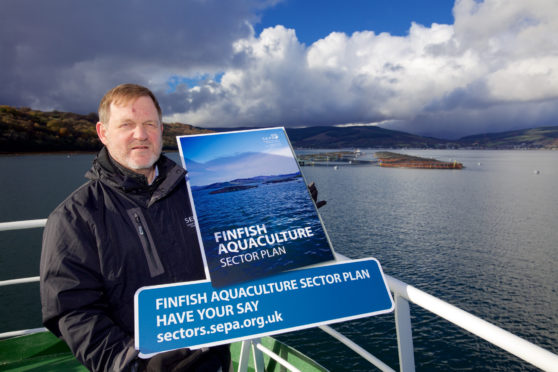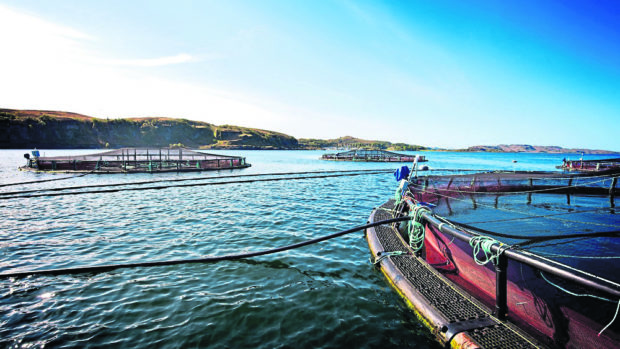Tough new rules are being brought in for salmon farms after a major study raised concerns about chemicals used to treat sea lice.
The medicines used by fish farms are having more of an impact on the marine environment than previously thought, the work by Sepa (Scottish Environment Protection Agency) revealed.
Now the body wants to make new regulations and create an enforcement unit to ensure they are met.
Some salmon farms could close as a result of the new regulations, Sepa’s chief executive Terry A’Hearn said.
And the new approach could allow for larger farms than traditionally approved.
Mr A’Hearn said: “We agree that ‘the status quo is not an option’ which is why we’re announcing firm, evidence based proposals for a revised regime that will strengthen the regulation of the sector.
“Some operators may decide to close some sites that are in shallower waters where the environmental impact is bigger, then move to deeper and faster flowing waters. Some may look at containment.”
Jim Gallagher, managing director of Scottish Sea Farms, said: “Where this new regime requires us to change our activity at existing farms we will happily do so. Equally, we fully embrace the opportunity to farm in more exposed, higher dispersal locations and to this end we have been investing in the new technologies necessary to make this possible.”
Sepa will host a series of nine events across Scotland during November and December where people can find out more and talk directly with specialist teams.
 Environment Secretary Roseanna Cunningham said: “The Scottish Government is absolutely committed to an aquaculture policy and regulatory framework that enables sustainable growth while maintaining our economic, environmental and social responsibilities.
Environment Secretary Roseanna Cunningham said: “The Scottish Government is absolutely committed to an aquaculture policy and regulatory framework that enables sustainable growth while maintaining our economic, environmental and social responsibilities.
“We have been working to improve the sustainability of the salmon farming sector for some time and look forward to seeing and absorbing the details of Sepa’s recommendations.”
Julie Hesketh-Laird, chief executive of the Scottish Salmon Producers Organisation, said: “We share Sepa’s vision of an innovative, sustainable salmon industry underpinned by clear and accurate regulation.
“It should be remembered that salmon farmers were operating to Sepa guidelines throughout the past five years.”
“Fish Farm Survey Report – Evaluation of a New Seabed Monitoring Approach to Investigate the Impacts of Marine Cage Fish Farms,” was undertaken by specialist marine scientists using research vessel the Sir John Murray.
It examined environmental impacts from eight Scottish fish farms and found residues of the chemicals more widely spread around them than previously found.
Professor Paul Tett
Professor Paul Tett of the Scottish Association for Marine Science (Sams) in Oban led a 2018 review for the Scottish Parliament into the environmental impacts of salmon farming in Scotland.
He welcomed the work by Sepa and said it would help the industry be as sustainable as possible.
Prof Tett said: “Sepa has used a new and highly sensitive method to measure emamectin benzoate (EMB) residues in sediment near salmon farms. The findings from their report show that EMB spreads further from farms than was previously observed. They also show that it was associated with an adverse effect on the small crustaceans that live in these muds and sands.
“The Sepa findings are closely aligned with those of the PAMP 2 report produced by Dr Tom Wilding of Sams for the Scottish Aquaculture Research Forum, which also linked the use of EMB with substantial declines in both the richness and abundance of non-target crustaceans.
“I welcome Sepa’s announcement of evidence-based proposals for a revised regulatory regime and for a consultation which should help to ensure our salmon farming industry is as sustainable as possible.”
